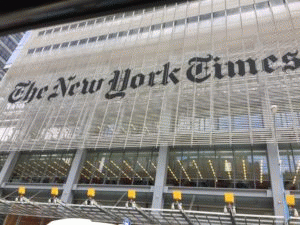From Consortium News
If Russia-gate is the massive scandal that we are told it is by so many Important People -- across the U.S. mainstream media and the political world -- why do its proponents have to resort to lies and exaggerations to maintain the pillars supporting the narrative?
A new example on Thursday was The New York Times' statement that a Russian agency "spent $100,000 on [Facebook's] platform to influence the United States presidential election last year" -- when the Times knows that statement is not true.
According to Facebook, only 44 percent of that amount appeared before the U.S. presidential election in 2016 (i.e., $44,000) and few of those ads addressed the actual election. And, we know that the Times is aware of the truth because it was acknowledged in a Times article in early October.
As part of that article, Times correspondents Mike Isaac and Scott Shane reported that the ads also covered a wide range of other topics: "There was even a Facebook group for animal lovers with memes of adorable puppies that spread across the site with the help of paid ads."
As nefarious as the Times may think it is for Russians to promote a Facebook page about "adorable puppies," the absurdity of that concern -- and the dishonesty of the Times then "forgetting" what it itself reported just two months ago about the timing and contents of these "Russian-linked ads" -- tells you a great deal about Russia-gate.
On Thursday, the Times chose to distort what it already knew to be true presumably because it didn't want to make the $100,000 ad buy (which is not a particularly large sum) look even smaller and less significant by acknowledging the pre-election total was less than half that modest amount -- and even that total had little to do with the election.
Why would the Times lie? Because to tell the truth would undercut the narrative of evil Russians defeating Hillary Clinton and putting Donald Trump in the White House -- the core narrative of Russia-gate.
Another relevant fact is that Facebook failed to find any "Russian-linked" ads during its first two searches and only detected the $100,000 after a personal visit from Sen. Mark Warner, D-Virginia, the vice chairman of the Senate Intelligence Committee and a leading legislator on Internet regulation.
In other words, Facebook's corporate executives dredged up something to appease Warner. That way, Warner and the Democrats could blame Russia for the Trump presidency, sparing further criticism of Clinton's dreadful campaign (in which she labeled half of Trump's voters "deplorables") and her neo-liberal economic policies (and neo-conservative foreign policies) that have alienated much of America's working class as well as many progressives.
Leaving Out Context
The Times also might have put the $100,000 in "Russian-linked" ads over a two-year period in the context of Facebook's $27 billion in annual revenue, but the Times didn't do that -- apparently because it would make even the full $100,000 look like a pittance.
Trimming the total down to $44,000 and admitting that only a few of those ads actually dealt with Clinton and Trump would be even worse for the Russia-gate narrative.
Ironically, the Times' latest false depiction of the $100,000 in ads as designed "to influence" the 2016 election appeared in an article about Facebook determining that other Russian-linked ads, which supposedly had a powerful effect on Great Britain's Brexit vote, totaled just three ads at the cost of 97 cents. (That is not a misprint.)
According to Facebook, the three ads, which focused on immigration, were viewed some 200 times by Britons over four days in May 2016. Of course, the response from British parliamentarians who wanted to blame the Brexit vote on Moscow was to assert that Facebook must have missed something. It couldn't be that many Britons had lost faith in the promise of the European Union for their own reasons.
(Note: You can view every article as one long page if you sign up as an Advocate Member, or higher).






